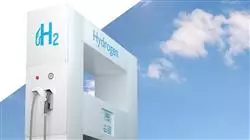University certificate
The world's largest faculty of engineering”
Introduction to the Program
With this 100% online Postgraduate diploma you will become a specialist in Hydrogen Facility Design"

Green hydrogen is proving in recent years to be an effective alternative for reducing CO2 emissions in vehicles or industrial sectors. This has led to the promotion of projects, especially in the automotive sector, that offer a viable mobility option, which requires not only changes in vehicle design, but also in refueling stations.
In this sense, the use of hydrogen and its possibilities are much more visible to the population in this sector, although the end uses are multiple, favoring the industrial, chemical or semiconductor sectors, for example. A scenario of innovation, which requires, on the part of engineering professionals, a deep knowledge to further boost this sector. In this line, TECH offers this Postgraduate diploma in Hydrogen Facility Design in which provides the most advanced and current knowledge in this area.
A program, where students will have access to a theoretical and practical agenda, which will lead them to delve into the use of hydrogen as a raw material in industrial processes, the many possibilities around their end uses, as well as the technical and regulatory elements required for the creation of facilities. All this with multimedia content of quality elaborated by a specialized faculty in the sector.
Graduates will also be able to reduce the long hours of memorization and study, thanks to the Relearning method used by TECH in all its courses. The system, based on the reiteration of content, will allow students to acquire learning in a more natural and progressive way.
Therefore, engineering professionals have an excellent opportunity to advance their careers through a 100% online university education, which they can study whenever and wherever they wish. All you need is an electronic device (computer, tablet or cell phone) with an Internet connection to access, at any time, the contents of the virtual campus. In addition, they have the freedom to distribute the teaching load according to their needs, making this university education easily compatible with the most demanding responsibilities.
Stand out in a sector that demands highly qualified engineering professionals for the development of hydrogen facility projects"
This Postgraduate diploma in Hydrogen Facility Design contains the most complete and up-to-date scientific program on the market. The most important features include:
- Case studies presented by engineering experts
- The graphic, schematic and practical contents of the book provide technical and practical information on those disciplines that are essential for professional practice
- Practical exercises where self-assessment can be used to improve learning
- Its special emphasis on innovative methodologies
- Theoretical lessons, questions to the expert, debate forums on controversial topics, and individual reflection assignments
- Content that is accessible from any fixed or portable device with an Internet connection
You are in front of an academic option that gives you the opportunity to access whenever you want to this course syllabus, without classes with fixed schedules. Enroll now”
The program’s teaching staff includes professionals from the field who contribute their work experience to this educational program, as well as renowned specialists from leading societies and prestigious universities.
The multimedia content, developed with the latest educational technology, will provide the professional with situated and contextual learning, i.e., a simulated environment that will provide immersive education programmed to learn in real situations.
This program is designed around Problem-Based Learning, whereby the professional must try to solve the different professional practice situations that arise during the academic year For this purpose, the students will be assisted by an innovative interactive video system created by renowned and experienced experts.
This program will enable you to learn about the main issues involved in the replacement of natural gas by hydrogen"

This program will enable you to learn about the main issues involved in the replacement of natural gas by hydrogen"
Why study at TECH?
TECH is the world’s largest online university. With an impressive catalog of more than 14,000 university programs available in 11 languages, it is positioned as a leader in employability, with a 99% job placement rate. In addition, it relies on an enormous faculty of more than 6,000 professors of the highest international renown.

Study at the world's largest online university and guarantee your professional success. The future starts at TECH”
The world’s best online university according to FORBES
The prestigious Forbes magazine, specialized in business and finance, has highlighted TECH as “the world's best online university” This is what they have recently stated in an article in their digital edition in which they echo the success story of this institution, “thanks to the academic offer it provides, the selection of its teaching staff, and an innovative learning method aimed at educating the professionals of the future”
A revolutionary study method, a cutting-edge faculty and a practical focus: the key to TECH's success.
The most complete study plans on the university scene
TECH offers the most complete study plans on the university scene, with syllabuses that cover fundamental concepts and, at the same time, the main scientific advances in their specific scientific areas. In addition, these programs are continuously being updated to guarantee students the academic vanguard and the most in-demand professional skills. In this way, the university's qualifications provide its graduates with a significant advantage to propel their careers to success.
TECH offers the most comprehensive and intensive study plans on the current university scene.
A world-class teaching staff
TECH's teaching staff is made up of more than 6,000 professors with the highest international recognition. Professors, researchers and top executives of multinational companies, including Isaiah Covington, performance coach of the Boston Celtics; Magda Romanska, principal investigator at Harvard MetaLAB; Ignacio Wistumba, chairman of the department of translational molecular pathology at MD Anderson Cancer Center; and D.W. Pine, creative director of TIME magazine, among others.
Internationally renowned experts, specialized in different branches of Health, Technology, Communication and Business, form part of the TECH faculty.
A unique learning method
TECH is the first university to use Relearning in all its programs. It is the best online learning methodology, accredited with international teaching quality certifications, provided by prestigious educational agencies. In addition, this disruptive educational model is complemented with the “Case Method”, thereby setting up a unique online teaching strategy. Innovative teaching resources are also implemented, including detailed videos, infographics and interactive summaries.
TECH combines Relearning and the Case Method in all its university programs to guarantee excellent theoretical and practical learning, studying whenever and wherever you want.
The world's largest online university
TECH is the world’s largest online university. We are the largest educational institution, with the best and widest online educational catalog, one hundred percent online and covering the vast majority of areas of knowledge. We offer a large selection of our own degrees and accredited online undergraduate and postgraduate degrees. In total, more than 14,000 university degrees, in eleven different languages, make us the largest educational largest in the world.
TECH has the world's most extensive catalog of academic and official programs, available in more than 11 languages.
Google Premier Partner
The American technology giant has awarded TECH the Google Google Premier Partner badge. This award, which is only available to 3% of the world's companies, highlights the efficient, flexible and tailored experience that this university provides to students. The recognition as a Google Premier Partner not only accredits the maximum rigor, performance and investment in TECH's digital infrastructures, but also places this university as one of the world's leading technology companies.
Google has positioned TECH in the top 3% of the world's most important technology companies by awarding it its Google Premier Partner badge.
The official online university of the NBA
TECH is the official online university of the NBA. Thanks to our agreement with the biggest league in basketball, we offer our students exclusive university programs, as well as a wide variety of educational resources focused on the business of the league and other areas of the sports industry. Each program is made up of a uniquely designed syllabus and features exceptional guest hosts: professionals with a distinguished sports background who will offer their expertise on the most relevant topics.
TECH has been selected by the NBA, the world's top basketball league, as its official online university.
The top-rated university by its students
Students have positioned TECH as the world's top-rated university on the main review websites, with a highest rating of 4.9 out of 5, obtained from more than 1,000 reviews. These results consolidate TECH as the benchmark university institution at an international level, reflecting the excellence and positive impact of its educational model.” reflecting the excellence and positive impact of its educational model.”
TECH is the world’s top-rated university by its students.
Leaders in employability
TECH has managed to become the leading university in employability. 99% of its students obtain jobs in the academic field they have studied, within one year of completing any of the university's programs. A similar number achieve immediate career enhancement. All this thanks to a study methodology that bases its effectiveness on the acquisition of practical skills, which are absolutely necessary for professional development.
99% of TECH graduates find a job within a year of completing their studies.
Postgraduate Diploma in Hydrogen Facility Design
The use of hydrogen as a renewable energy source is increasingly present in different industrial and residential sectors. In this sense, the demand for professionals trained in the design and development of hydrogen facilities has increased significantly in recent years. Given this scenario, in TECH Global University we designed the most complete and updated Postgraduate Diploma in Hydrogen Facility Design in the educational panorama. Through a 100% online education, we offer you the opportunity to obtain a world-class degree, accessing self-managed classes, innovative multimedia content and tutorials with an experienced teaching staff. Through the curriculum, we will provide you with the tools you need to both understand how hydrogen facilities work and how to design them effectively.
Train yourself in the design of hydrogen facilities
At TECH we focus on offering you high quality training, which will allow you to become a highly qualified and competitive professional in the labor market. With our program, you will acquire the theoretical and practical knowledge you need to develop your professional career in the field of renewable energies and the design of hydrogen facilities. As you progress through the curriculum, you will have the opportunity to learn about the fundamental principles of hydrogen as an energy source, hydrogen production and storage processes, as well as hydrogen supply systems and applications in different sectors. In addition, you will acquire skills in the design of hydrogen facilities and their integration into different types of applications. Finally, we will provide you with the necessary technical knowledge to enable you to develop innovative and sustainable projects in the hydrogen field.







